
-
Hitta rätt mat för ditt husdjurGör det här testet för att se vilket foder som kan vara bäst för din pälskling.Hitta rätt mat för ditt husdjurGör det här testet för att se vilket foder som kan vara bäst för din pälskling.Utvalda produkter
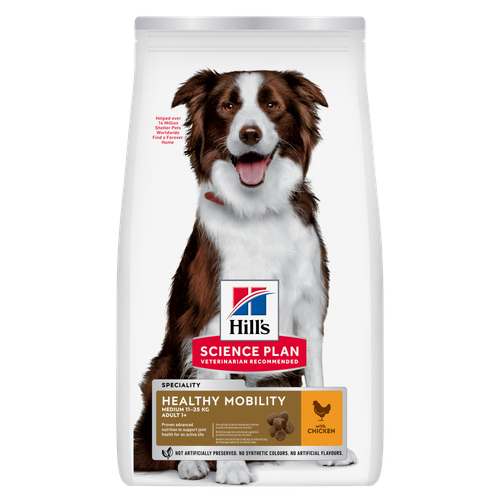 Healthy Mobility Medium Adult Hundfoder
Healthy Mobility Medium Adult HundfoderHill's Science Plan Healthy Mobility Medium Breed Adult Hundfoder med kyckling erbjuder en avancerad nutrition för att stödja ledhälsa och förbättra rörligheten. provides advanced nutrition to support joint health and improve mobility.
Handla nu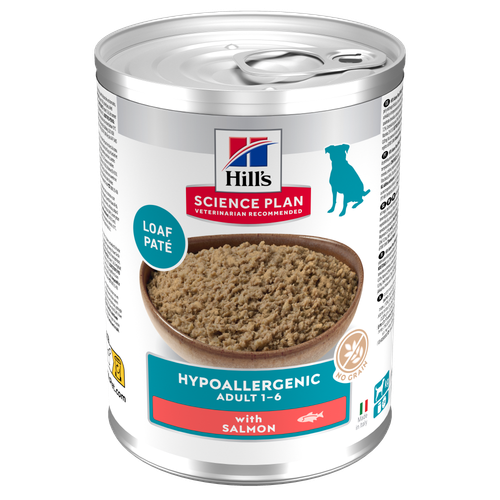 Hypoallergenic Adult Hundfoder
Hypoallergenic Adult HundfoderHill's Science Plan Hypoallergenic Adult våtfoder med lax är ett komplett helfoder av högsta kvalitet för alla vuxna hundar från 1 år och uppåt. Detta läckra våtfoder i burk är speciellt sammansatt för hundar med känslig hud och mage. Den innehåller en enda animalisk proteinkälla och är spannmålsfri.
Handla nu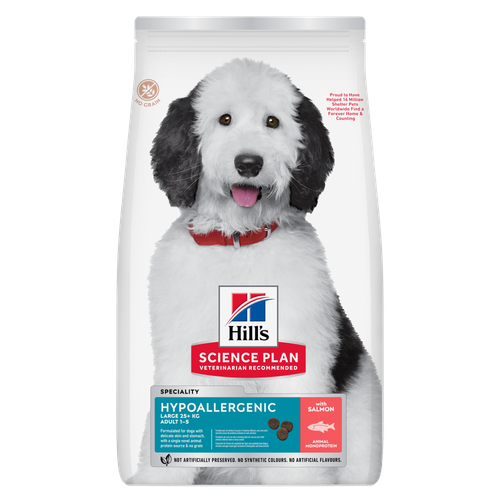 Hypoallergeniskt hundfoder för vuxna hundar med lax
Hypoallergeniskt hundfoder för vuxna hundar med laxHILL'S SCIENCE PLAN Hypoallergenic Large Breed Adult hundfoder med lax är ett komplett foder för vuxna hundar av stora raser i åldern 1–5 år. Det är särskilt framtaget för hundar med känslig hud och mage, med begränsade mängder högkvalitativa och nya proteinkällor samt utan spannmål.
Handla nuHälsotillståndUtvalda produkter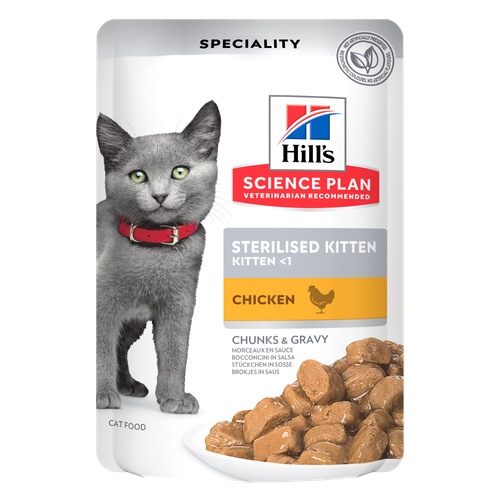 Sterilised Kattungefoder
Sterilised KattungefoderHill's SCIENCE PLAN Sterilised Kitten kattungefoder är skapat med Hill´s unika förståelse för de specifika behov som kastrerade kattungar har. Det bidrar med hög proteinkvalitet för muskelutveckling, med kontrollerat fett för att förebygga risk för övervikt efter kastrering. Dessutom har det en unik blandning av antioxidanter för att främja ett hälsosamt immunsystem för att stöjda din kattunges tillväxt.
Handla nu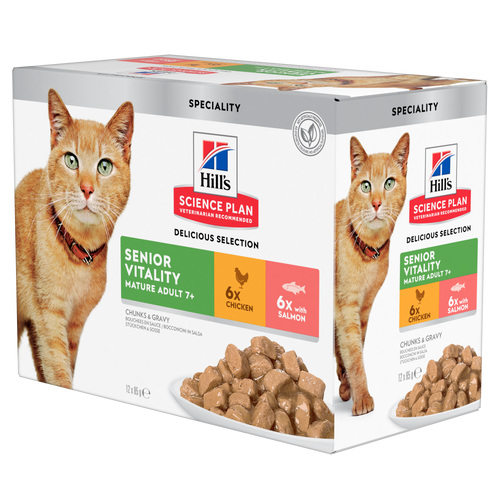 Hill's Science Plan SENIOR VITALITY KATTFODER Kyckling, med laxHandla nu
Hill's Science Plan SENIOR VITALITY KATTFODER Kyckling, med laxHandla nu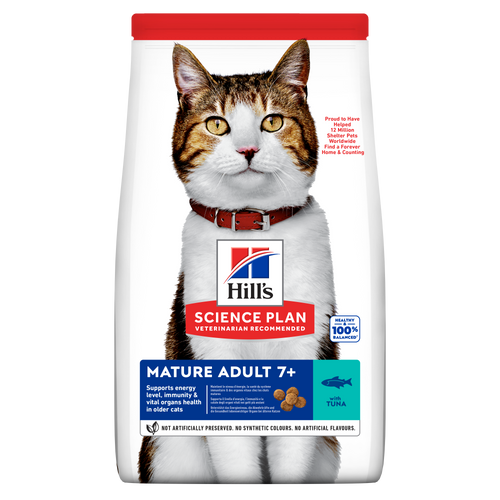 Mature Adult Kattfoder
Mature Adult KattfoderHill's Science Plan Adult kattfoder med lax är ett helfoder för äldre katter, speciellt utformat med ActivBiome+ Multi-Benefit teknologi.
Detta foder främjar ett värdigt åldrande hos katter och innehåller en synergistisk blandning av ingredienser som bidrar till att upprätthålla energi- och aktivitetsnivån.Handla nu -
Till hundägare
- Tips och artiklar
-
Hälsokategori
- Vikthantering
- Miljö- och foderöverkänslighet
- Urinvägar
- Matsmältning
- Leder
- Njurar
-
Hundens livsstadium
- Näring för valpar
- Näring för vuxna katter
- Näring för seniorer
Till kattägare- Tips och artiklar
-
Hälsokategori
- Vikthantering
- Hud- & foderöverkänslighet
- Urinvägar
- Matsmältning
- Njurar
-
Kattens livsstadium
- Näring för kattungar
- Näring för vuxna
- Näring för seniorer
Utvalda artiklar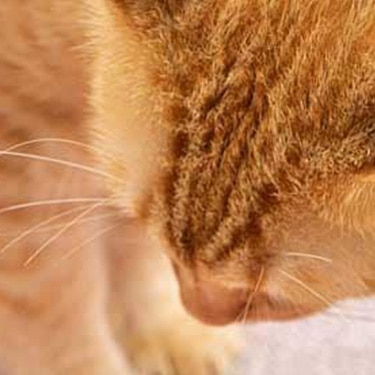 Kristaller och stenar i hund- och katturin
Kristaller och stenar i hund- och katturinLäs om orsaker till och behandlingar av kristaller i hund- och katturin för att bibehålla hundens eller kattens hälsa. För expertråd om urinvård, besök Hill's Pet Sverige.
Läs mer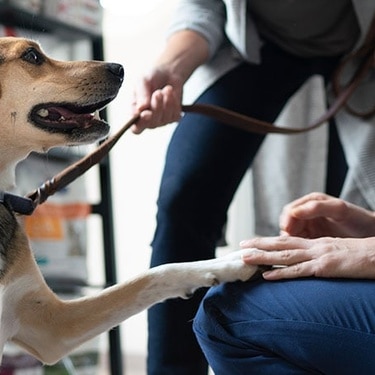 Viktförändringar hos hundar och katter - kan det vara ett sköldkörtelproblem?
Viktförändringar hos hundar och katter - kan det vara ett sköldkörtelproblem?En viktförändring kan tyda på ett problem med sköldkörteln. Läs mer om tecken, orsaker och vad du kan göra åt det.
Läs mer Virtual Vet Visits: What You Need to Know
Virtual Vet Visits: What You Need to KnowLearn the ins and outs of a televet appointment before you talk to a vet online.
Läs mer -


Choosing cat nutrition and the healthiest food for your cat can be difficult. Bringing home a kitten or cat from the animal shelter can evoke similar concerns as bringing home a new baby from the hospital. What's the healthiest cat food to feed? What nutrients are most important? How can you choose a cat food that keeps your cat fit and healthy?
Cats are carnivores, meaning their nutrition is primarily made up of animal proteins. In the wild, they eat small game such as rodents, birds, and fish. Once cats become domesticated, however, they rely on their human guardian for all of their nutritional needs. Before you bring your new pet home, learn all you can about what to serve her. The right food prevents health problems and ensures that she'll maintain a healthy weight for her breed and activity level.
What All Cats Need - The Right Cat Nutrition
Cats need the following nutrients to keep them healthy:
- Protein: Protein is essential for cats. Protein helps promote lean muscle growth.
- Fats: Fat is often found in the form of fatty acids such as omega-3 and omega-6. Similar to humans, too much fat can lead to weight gain, but the proper amount of fat can help keep their skin and coat healthy.
- Fiber: Cats need the correct amount of fiber–found in sources like brown rice–to support proper digestive health and prevent excess gas and other gastrointestinal problems.
- Water: Cats require plenty of fresh, clean water daily in order to remain healthy on a daily basis. Always supply your cat with as much water as she'd like to drink by leaving out a bowl, automatic refilling tower, or a similar reservoir that replenishes it for her when you're not home.
Cats also need plenty of vitamins and minerals in their food. In the wild, these vitamins and minerals are available in their prey. But a domestic cat must receive adequate vitamins and minerals through her food.
Like people, cats need vitamins A, E, K, and B vitamins. Folic and pantothenic acids are also required for healthy growth and maintenance. According to PetMD, cats produce plenty of vitamin C on their own, unlike their pet parents, and do not need supplemental vitamin C to stay healthy. Additional minerals that cats need include calcium, phosphorous, and iodine. Taurine is a required essential amino acid that cat's need in their daily nutrition. These vitamins, minerals and nutrients should be provided in the cat food she is fed, there is no need to supplement.
Carbs
You may have noticed an entire food group left out: carbohydrates. Fruits, vegetables, and grains are all healthy members of this category, but cats have a shorter large intestine than omnivores (like people), and therefore have trouble digesting large amounts of it. If your cat has trouble digesting certain carbohydrates, a high-quality cat food such as Hill's® Science Diet® may provide adequate carbohydrates in an easily digestible form.
When These Needs Vary
Kittens and nursing mom cats both need more calories and more nutrient-dense foods. Kittens, for example, need more fat and protein to build strong bones, while pregnant and nursing cats need higher levels of fats and other nutrients to help support their growing kittens. Senior cats need fewer fats to help maintain a healthy weight. At each stage of your cat's life, she needs different nutrients.


Smakrika tips
Kattungar kan behöva flera besök under sitt första år för vaccinationer. Vuxna katter har i allmänhet nytta av årliga kontroller, medan seniorkatter eller katter med särskilda behov kan behöva mer frekventa besök.
Choosing the Healthiest Cat Food
Choosing the healthiest cat food may take time. Assuming your cat's veterinarian hasn't found a major health issue affected by their food, create a cat meal plan that's simple and easy to follow. Both canned and dry food provide complete nutrition.
If your cat does have a health issue, your vet can help you find the right food to ensure she gets the correct nutrients to help with health conditions, including issues with weight management, food allergies or intolerance and kidney health.
Some pet parents prefer to feed one form of food in the morning and another at night. For example, before you go to work, you may want to fill your cat's bowl with dry food. Then when you go to bed at night, you can offer her a small plate of wet food. This type of feeding schedule helps keep your cat's weight in check while providing plenty of nutrients for her general well-being.
Common Feeding Concerns
How can you tell if the cat food you've chosen is just right? It's a learning process, and there are several things new cat parents should remember when it comes to cat nutrition:
Avoid Overfeeding
Cats love food just like you. The difference is they don't know to wait the twenty minutes to realize they're full after the bowl's empty. Your cat may, therefore, ask for more after she finishes her morning dry food or evening plate of wet. As much as you'd love a second or third helping, your jeans won't fit if you don't listen to your body.
By the same token, giving in to every meow will cause her to gain weight in no time. So keep an eye on her waistline–a healthy cat should be lean and trim. You don't want to see ribs or bones protruding, but when you run your hands over her sides you should be able to feel plenty of definition. An overweight cat has rolls of fat on the abdomen, sides, and face, and tends to act lethargic aside from her usual naps.
One Type of Food or Two?
A common cat feeding question that exists is, "Can I serve only one type of cat food, wet or dry?" Cats can exist on a meal plan with just dry food, receiving a complete source of balanced nutrition as well as fiber for healthy digestion. Read the labels when purchasing a high-quality, veterinarian-recommended food to ensure she's getting all she needs. If you're concerned that your cat is not drinking enough water, you can investigate supplementing dry cat food with wet cat food.
Provide Enough Water
Due to their size and activity level, there's a common misconception that cats don't need a lot of water. On the contrary, they should have plenty of fresh water available at all times. Some cats are very finicky about their water source, so keep your cat's water bowl scrupulously clean and refill it daily. Remember, an automatically refilled tower is a big help for multi-cat households, as it provides a constant, fresh supply so you don't have to tend to it as often.
No People Food
Table scraps are a fast track to obesity for many cats, adding calories without adequate nutrition. And never feed your cat chocolate, caffeinated drinks like cola or coffee, raisins, grapes, or onions–all of which are poisonous to cats. Foods that include these ingredients can be deadly.
Avoid Milk
Believe it or not, most cats are lactose intolerant. Feeding your cat a bowl of milk may actually give her gas, indigestion, and a very upset stomach. If you want to give your cat a treat, a few kibbles of her cat food, some catnip or homemade cat treats are a better option.
The right cat food can keep your pet healthy and active for many years to come. By choosing a high-quality cat food, keeping her hydrated, and avoiding some of the common myths mentioned above, you'll provide the best nutrition for your pet.


Jeanne Grunert är en bokförfattare, bloggare och frilansskribent från Virginia. Hon har sex katter och en hund som heter Shadow, alla från djurhem, på hennes 17 hektar stora gård i Virginia.
Relaterade produkter

Hill's SCIENCE PLAN Sterilised Kitten kattungefoder är skapat med Hill´s unika förståelse för de specifika behov som kastrerade kattungar har. Det bidrar med hög proteinkvalitet för muskelutveckling, med kontrollerat fett för att förebygga risk för övervikt efter kastrering. Dessutom har det en unik blandning av antioxidanter för att främja ett hälsosamt immunsystem för att stöjda din kattunges tillväxt.

Hill's Science Plan Adult kattfoder med lax är ett helfoder för äldre katter, speciellt utformat med ActivBiome+ Multi-Benefit teknologi.
Detta foder främjar ett värdigt åldrande hos katter och innehåller en synergistisk blandning av ingredienser som bidrar till att upprätthålla energi- och aktivitetsnivån.
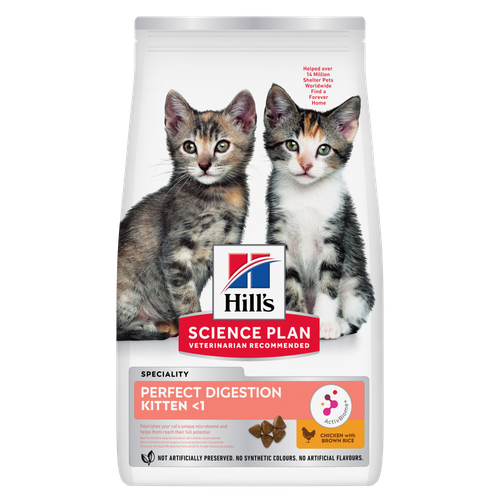
Hill's Science Plan Perfect Digestion Foder till Kattungar med Kyckling & Fullkornsris ger näring åt din kattunges unika mikrobiom och hjälper dem att nå sin fulla potential.

Relaterade artiklar
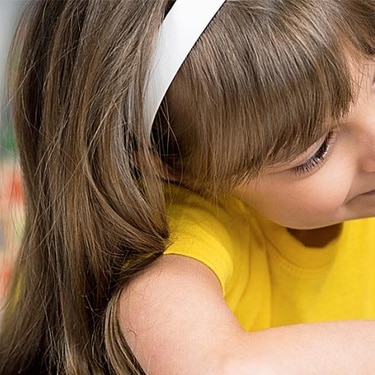
Discover how to train your cat, starting with very basic first steps that both reward good behavior and discourage the bad. It
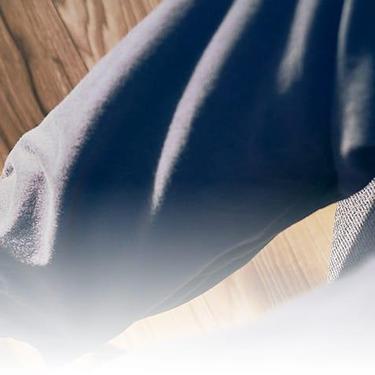
Upptäck roliga och engagerande spel för katter som även fungerar som bra motionskällor. Utforska spännande sätt att hålla din katt aktiv och underhållen!
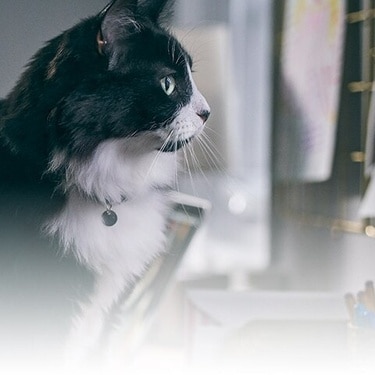
Lär dig mer om orsakerna till hårbollar hos katter och upptäck effektiva behandlingar för att hålla din katt frisk. Besök Hill's Pet Sverige för fler råd om katters hälsa.
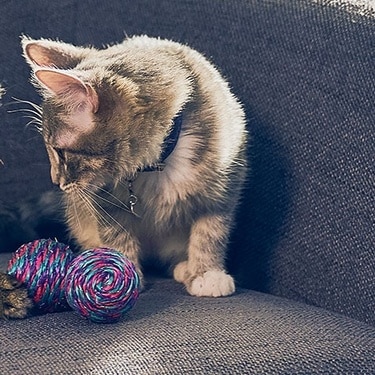
Are you looking to get your cat more active? Does she constantly look bored? Then you may want to consider using a food-dispensing (also known as treat-dispensing) cat toy, which provides both physical and mental stimulation during snack times.

Sätt din katt på diet utan att den märker det
Vår kalorifattiga sammansättning hjälper dig att kontrollera din katts vikt. Den innehåller högkvalitativt protein för att bygga slanka muskler och är tillverkad med noga utvalda ingredienser för en smakrik och näringsrik måltid. Kliniskt bevisade antioxidanter, vitamin C+E, bidrar till ett friskt immunförsvar.
Sätt din katt på diet utan att den märker det
Vår kalorifattiga sammansättning hjälper dig att kontrollera din katts vikt. Den innehåller högkvalitativt protein för att bygga slanka muskler och är tillverkad med noga utvalda ingredienser för en smakrik och näringsrik måltid. Kliniskt bevisade antioxidanter, vitamin C+E, bidrar till ett friskt immunförsvar.

